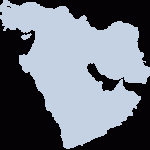Monday
May242010
Middle East Inside Line: Israel's Settlements; Syria's Defiance
 Monday, May 24, 2010 at 8:32
Monday, May 24, 2010 at 8:32  Pressure on Netanyahu over Settlements: On Thursday, fifty-six members of the Knesset petitioned Israeli Prime Minister Benjamin Netanyahu and Defense Minister Ehud Barak to allow construction of a neighbourhood in the West Bank settlement of Ariel. The building would break Netanyahu's promise to freeze building in the West Bank for 10 months.
Pressure on Netanyahu over Settlements: On Thursday, fifty-six members of the Knesset petitioned Israeli Prime Minister Benjamin Netanyahu and Defense Minister Ehud Barak to allow construction of a neighbourhood in the West Bank settlement of Ariel. The building would break Netanyahu's promise to freeze building in the West Bank for 10 months.The neighourhood would house evacuees of the former Gaza Strip settlement of Netzarim, who have been without permanent housing since Israel's disengagement in 2005.
Israel-Palestine Analysis: The 2nd Round of Proximity Talks (Yenidunya)
Israel Revealed: Tel Aviv Offered Nuclear Weapons to South Africa
Syria Takes No "Step Back": Syrian President Bashar al-Assad met with French Foreign Minister Bernard Kouchner in Damascus on Sunday and urged the West to "break its silence" in the face of Israeli "aggression" in the Middle East. According to Syria's official news agency SANA, Assad said:
The region has changed and the West's policy in the area is no longer acceptable, keeping silent over Israeli violations is no longer acceptable.
If the West wants security and stability to be established in the Middle East, [it] must start to play an effective role to contain Israel and put an end to its extremist policies.
Then, he defended Damascus' ally and neighbour Iran:
The countries involved need to change their attitude to Iran's civil nuclear program, because this agreement is an important opportunity to reach a diplomatic solution and prevent a tragic dispute in the region and the world at large.
Late Sunday, Foreign Minister Walid Moallem sharpened Syria's tone during a meeting with his German counterpart Guido Westerwelle. He said that Damascus "will not be a policeman for Israel" and added:
Why are arms forbidden to Arabs and allowed to Israel? Did Israel ever stop arming itself, did it stop instigating violence or making military maneuvers?
Israel is beating the drum of war. In the absence of real peace every thing is possible.
Israel's Drill and Hezbollah: Hezbollah has mobilized thousands of its militants in southern Lebanon ahead of a major Israel Defense Forces drill, "Turning Point 4", AFP reported.
While Lebanese Prime Minister Saad Hariri met with Egyptian President Hosni Mubarak in Cairo ahead of his visit to Washington, Hezbollah's deputy head, Nabil Qaouk, said thousands of Hezbollah fighters will not take part in Lebanon's municipal elections on Sunday because they are preparing for the possible attack by Israel.
Israel has sent messages to Arab states about the drill, stressing that it has no plans to launch an attack.
Washington Approves Israel's Iron Dome Defense System: The U.S. House of Representatives on Thursday voted in favour of President Barack Obama's plans to help Israel fund the deployment of the Iron Dome anti-missile defense system.
Lawmakers, by a 410-4 margin, backed Obama's plan to give Israel $205 million for its production of a short-range rocket defense system.




